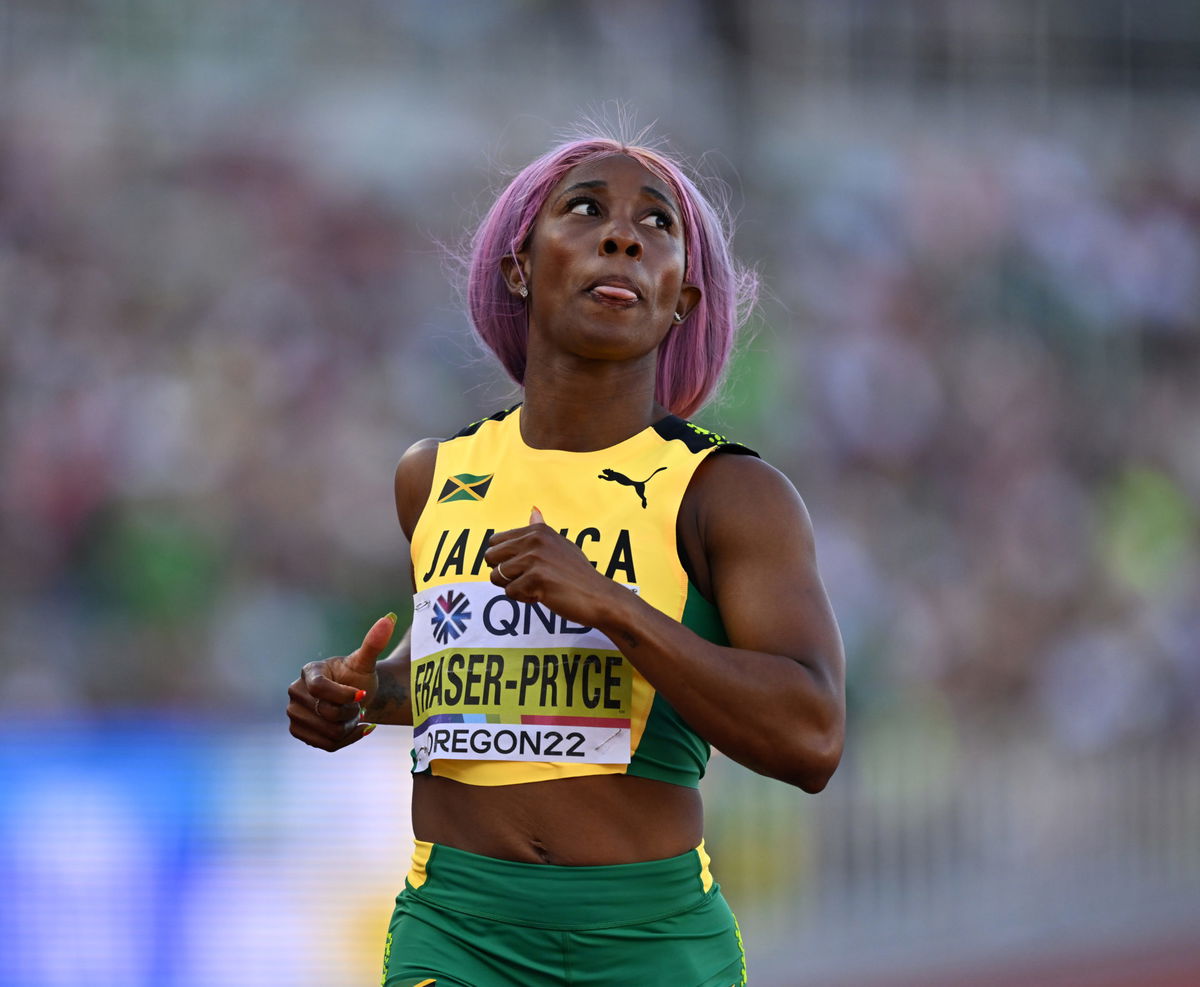
Getty
EUGENE, OREGON, USA – JULY 19: Shelly-Ann Fraser-Pryce of Team Jamaica competes in the Women’s 200m Semi-Final heats during the eighteenth edition of the World Athletics Championships at Hayward Field in Eugene, Oregon, United States on July 19, 2022. (Photo by Mustafa Yalcin/Anadolu Agency via Getty Images)

Getty
EUGENE, OREGON, USA – JULY 19: Shelly-Ann Fraser-Pryce of Team Jamaica competes in the Women’s 200m Semi-Final heats during the eighteenth edition of the World Athletics Championships at Hayward Field in Eugene, Oregon, United States on July 19, 2022. (Photo by Mustafa Yalcin/Anadolu Agency via Getty Images)
Being both a mother and an athlete poses its challenges, yet elite athletes like Shelly-Ann Fraser-Pryce have shown that pregnancy doesn’t have to hinder success. In early 2017, Fraser-Pryce announced her pregnancy shortly after winning two medals at the Rio 2016 Olympics. Initially, she was overwhelmed. “She sat on her bed and cried,” even ruling out a return for the 2017 World Athletics Championships. However, her frustration escalated when she felt unsupported by the track and field community as well.
Watch What’s Trending Now!
Owen M shared a post on X, in which he asked Shelly-Ann Fraser-Pryce, 37, about her experience of support during pregnancy and her hopes for future athletes. ” do you feel supported when you found out you were pregnant? What would you like to see when future athletes take time off to have babies?” Fraser-Pryce’s response hinted at the lack of support she felt, emphasizing the need for better support systems for athletes during maternity. Her statement, “I would say no, initially. I never really felt supported when I was pregnant by the wider community, because I think people weren’t used to it,” captures her initial sense of isolation amidst societal unfamiliarity with athlete pregnancies.
Despite this, she expressed gratitude for the support from her family and highlighted the importance of empowering women to make decisions about their careers and family lives without sacrificing one for the other. Fraser Pryce also underscored the importance of recognizing athletes for more than their sporting accomplishments asking, “Do we feel valued? Is it just that you want me to run? How do you support me as a mum?”
ADVERTISEMENT
Me: Did you feel supported when you found out you were pregnant? What would you like to see when future athletes take time off to have babies?
Shelly-Ann Fraser-Pryce’s response 👇 pic.twitter.com/gRh719Fa5R
— Owen M (@_OwenM_) June 19, 2024
Fraser Pryce also talked about her experiences. She shared a broader vision, for creating a more supportive environment in sports. She emphasized the importance of embracing and backing athletes in all aspects of their lives mentioning, “I’d definitely want to see other athletes supported more, and embraced.” As for the impact of her pregnancy on her career, it seems unlikely. Despite facing challenges during her pregnancy and giving birth to her son Zion in August that year, she continued to excel in her career. Although her recovery from the C section took longer than expected, Fraser Pryce made history at the 2019 World Championships by winning the 100m sprint at age 32, becoming the mother and oldest woman to achieve this milestone. She described this triumph as “a victory for motherhood.”
On the following occasion, she participated in the 2020 Tokyo Olympic Games, which took place in 2021 due to the impact of the COVID-19 outbreak. During that event, she secured a second-place finish in the 100 meters and clinched a first-place position in the 4 × 100 meter relay. Subsequently, at the 2022 World Championships she emerged victorious in the 100 meters event. Then. she competed at the World Championships, achieving a third-place finish, in the 100 meters race and claiming gold again in the 4 × 100 meter relay race.
ADVERTISEMENT
However, looking ahead to Paris, she has revealed plans to retire after the Paris Games this summer. Fraser-Pryce cited her family as the key to her decision, stating, “There’s not a day I’m getting up to go practice and I’m like, ‘I’m over this’… My son needs me. ” However, she is not the only athlete who faced such criticism during the pregnancy phase but persevered through it.
ADVERTISEMENT
Unlike Shelly-Ann Fraser, another athlete faces similar struggles
Allyson Felix, who is also looking ahead to Paris, faced similar challenges before that. Despite being a highly decorated athlete and one of Nike’s most prominently marketed stars, Felix encountered severe difficulties securing maternity protections from her sponsor. “If I can’t secure maternity protections, who can?” Felix questioned, emphasizing the gravity of the issue. During her pregnancy, Felix experienced considerable pressure to return to peak performance swiftly, even after undergoing an emergency C-section due to severe pre-eclampsia. “Nike wanted to pay me 70 percent less than before,” she revealed, highlighting the harsh reality she faced.
Allyson added, “
Athletes are told to shut up and play. We are told that no one cares about our politics. We are told that we’re just entertainers, so run fast, jump high, and throw far. And don’t mess up. But pregnancy is not messing up; for women it can and should be able to be part of a thriving professional athletic career, as my teammates have shown and I hope to show too. And I dream of a day when we don’t have to fight in order to try.” These situations shed light on the darker aspects of the track and field industry. Despite their remarkable athletic achievements, female athletes like Shelly-Ann Fraser and Allyson Felix faced challenges, particularly when it comes to balancing motherhood with their careers.ADVERTISEMENT
ADVERTISEMENT
ADVERTISEMENT
ADVERTISEMENT